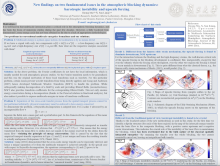A new finding on the role of the basic flow instability in energizing and asymmetrizing the Northern Hemisphere atmospheric blockings
Jiwang
Ma
Southern Marine Laboratory, Zhuhai, China; Fudan University, Shanghai, China.
Poster
The typical blockings over the Pacific, Atlantic, and Ural Mountain regions are investigated for an understanding of their dynamical interactions in a unified treatment with their respective basic flows and high-frequency processes, respectively. Thanks to the localized nature of the new methodology as used in this study, for the first time we identify a dipolar structure (for each of the three regions) in the map of the interscale energy transfer from the basic flow to the composite blocking, with a positive center upstream and a negative center downstream. This indicates the crucial role of the instability of the basic flow in the maintenance of blockings, which has been overlooked due to the bulk nature of the spatially integrated energetics (by summing the transfer over the whole blocking, the two centers essentially cancel out, leaving an insignificant bulk transfer). For the interaction between the blocking and the high-frequency storms, the well-known critical role of the upscale forcing in blocking development is confirmed. But, unexpectedly, except for that over the Atlantic where the forcing exists throughout, over the other two regions the forcing is found to occur mainly in downstream. This is quite different from what the classical theory, e.g., the famous eddy strain mechanism of Shutts (1983), would predict.

Poster file
Jiwang_Ma_blocking_poster.pdf
(832.47 KB)
Meeting homepage
